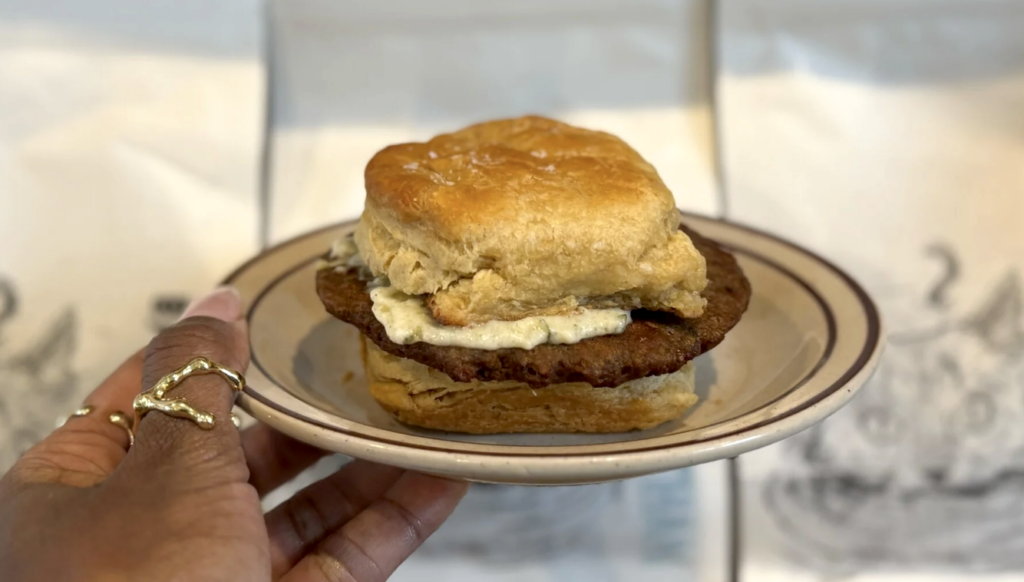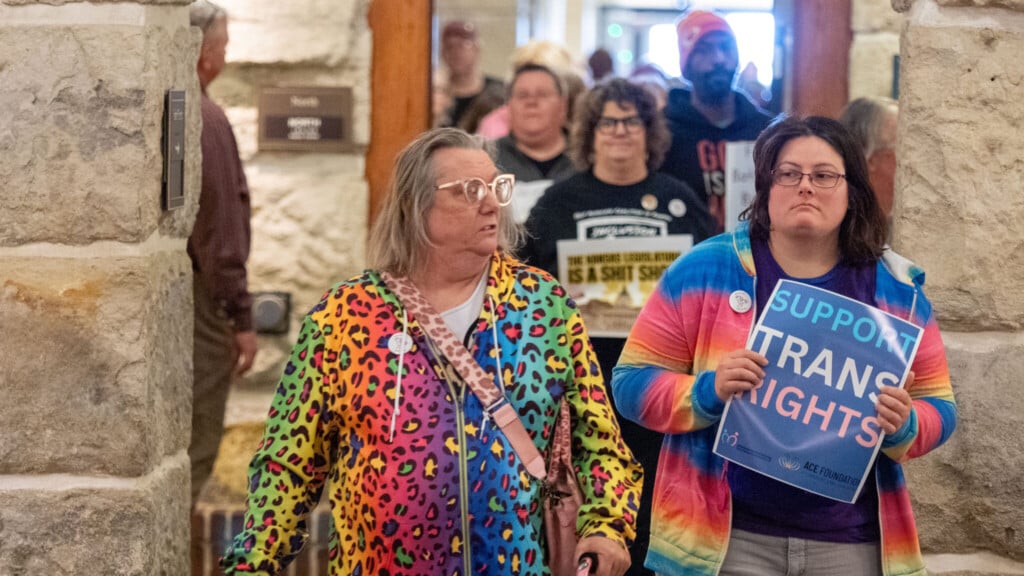Soldiers of Meth

Clad in desert fatigues and clutching M-16 rifles, four soldiers circle a wounded dog in the desert wasteland. Its hind legs are crushed. It has been slowly baking in the 120-degree heat. The men decide to rush its fate.
Backed by a dozen men and four Bradley tanks, the soldiers have blockaded a road to search suspicious vehicles a few miles outside the commandeered Tallil airstrip in southern Iraq. The men belong to the 41st Infantry Division, Bravo Company, a mechanized unit of 130 men from Fort Riley, Kansas. Their motto: straight and stalwart. The 41st has been on front lines from D-Day to Bosnia to the 1991 Gulf War.
It’s March 2003, and the men are edgy. Operation Iraqi Freedom is days old. They’ve been in hostile territory for a few days, but the soldiers in Bravo Company have yet to field-test their electronic-scope M-16s with live rounds. This will kill two birds with one stone, figures a sergeant. Test the weapons. Put the mutt out of its misery. He orders the men to lock their scopes on the whimpering target. When the sergeant gives the order, they unload.
The dog explodes like a piñata.
In the squad is a private in his early twenties named Eric Colvin. From rural Papillion, Nebraska, Colvin is tall, with birdlike features. He’s covered in macabre tattoos — his forearm boasts a fair-skinned archangel battling a black dragon. During the company’s tour of Iraq, Colvin will develop a reputation as the company’s crazy bastard. He’ll watch a man burn alive and see a little girl’s head get blown off. Part of his duty in the company is to raid corpses. He searches fresh kills and rummages through coffins to secure weapons. He talks about having nothing to come home to. His mom sold all of his belongings when he joined the Army.
Killing the dog also affects Colvin. Months later, the 41st Infantry Division moves south to the outskirts of the city of Hilla, running patrols through slums laced with insurgents. When they find a pair of sick puppies, Colvin figures he knows what to do.
What happens next is the first step in what will become the twisted legacy of Eric Colvin. The Pitch has pieced together that history from court documents; interviews with soldiers, their friends and families; and news reports from the Associated Press, the Manhattan Mercury and the Daily Union of Junction City. When Bravo returns to Fort Riley in July 2003, Colvin will become the central figure in a drug scheme that will divide his company. Soldiers will turn their own guns on one another.
“Let’s put them out of their misery,” he repeats constantly, trying to convince the others to kill them.
Finally, with a few soldiers looking on warily, Colvin gathers the pups. One by one, he snaps their necks.
Around 4 p.m. on June 9, 2004, two plainclothes police in an unmarked cruiser tail a blue 1996 Dodge pickup as it leaves a Target store in Manhattan, Kansas, 20 miles east of Fort Riley.
Minutes earlier, detectives Lucas Breault and Sonia Gregoire, both members of the Riley County Police Department’s Proactive Crime Unit drug force, received a tip from the store’s security guard: Two men had each just purchased two boxes of Sudafed, a cold medicine used to make methamphetamine.
Breault tails the truck as it turns left on Manhattan’s main drag, Seth Childs Road. When the driver doesn’t signal to change lanes, he flashes his cherries and pulls him over. Both men in the pickup are in their twenties. The driver, Bradley Nichols, works for Foot Locker. The passenger, Chris Brown, works at a nearby tire store. The car is registered to Aaron Stanley, a sergeant from Bravo.
Breault searches the vehicle. He finds the four boxes of Sudafed and a can of Presto lighting fluid, also a meth ingredient. Both men are detained while the officers issue a search warrant for Nichols’ address, a prefab home the size of a double-wide on 114 Jeanette Street in Belvue. Secluded, low-rent and hemmed by cornfields, the house fits the textbook profile of a drug lab.
At nightfall the following day, half a dozen agents from the Kansas Bureau of Investigation and the Pottawatomie County Tactical Team, dressed in riot helmets and Kevlar vests, kick in Nichols’ front door. Inside, they find a pipe, syringes and equipment for a small-time meth-cooking operation: tubing, hoses, lithium batteries, starter fluid, mason jars, isopropyl alcohol, funnels, gloves, coffee filters, scales and baggies. They find 5 grams of meth and 450 grams of pseudoephedrine (boiled-down Sudafed). They also find Bravo Company’s Stanley cozying up with Nichols’ sister, Adrienne Lynn.
The bust takes on some Cheaters-style drama when the cops learn that Lynn is married to another soldier in Fort Riley’s 41st Infantry Division, Charlie Company. News that Stanley was caught with another guy’s wife fosters distrust and bad blood among some men back in the barracks.
Stanley — his friends call him Stan — is a 23-year-old Bravo sergeant with an impeccable reputation. Though he claims to have once dealt small amounts of meth and coke in his hometown of Phoenix, Stanley is better known for keeping his hair high and tight, his uniform pressed and his bunk immaculate. He’s a regular-army poster boy: “Hardworking, motivated and reliable,” former Bravo Capt. Darin Thomson will say later. He aced physical training, read weapons manuals in his spare time and earned an invitation to Army Ranger school, which an illness forced him to miss. The drug task force that found him in the meth lab charges Stanley with six felony and two misdemeanor drug counts and holds him at the Pottawatomie County jail on $75,000 bond.
On July 7, Fort Riley’s Staff Judge Advocate, Lt. Col. David Velloney, strikes a deal with Pottawatomie County Prosecutor Sherri Schuck, allowing Stanley to return to Fort Riley. While awaiting his criminal trial, he’ll have to remain on base.
Later that month, when Stanley has to go to a court hearing, the volunteer to take him is none other than puppy killer Colvin.
Colvin made sergeant after returning from Iraq in July 2003, and he completed sniper training soon after. But back on the base, signs of a meltdown began to manifest themselves. He falsely bragged about beating an Iraqi boy, prompting a criminal investigation, according to a former sergeant. He told buddies that the Army considered him a threat. He claimed his phone was tapped. He talked about killing the president. Colvin eventually checked into the veterans hospital in Topeka. The Army has not made public why, but Colvin was not redeployed to Iraq with the rest of his unit, though he was released from the hospital in time to have gone.
Colvin hasn’t volunteered just to take Stanley to court. When the Bravo Company buddies leave the base, they drive to a farmhouse nearby, a place Stanley has picked out as a perfect spot for a new meth factory.
In August 2004, Chris Hymer, a specialist with Bravo Company, arrives home on leave acting like a hunted man. The beefy and tan 23-year-old still dresses sharp in jeans and clean T-shirts, but he doesn’t go out much. He smokes his Newport lights solemnly. He carries a gun.
“I’ve gotten into a lot of stuff I need to get out of,” he tells Sherry Hall, his best friend’s mom, while standing on the back deck of her Fort Scott home. Soldiers are getting into trouble regularly, using heavy drugs before they’re deployed. Things have gotten tense back at Fort Riley. Colvin has spread a rumor that he and another soldier messed around with Hymer’s wife. It’s one of several accusations of adultery dividing Bravo. Hymer confesses that he’s scared to return.
Hymer joined the Army to straighten out. He had a chip on his shoulder from childhood, when his mother passed him off to his truck-driving father and new stepmom. With his dad gone for extended hauls, Hymer would sneak out and slash tires — and he got busted. He eventually moved in with Hall, who became like a mother to him. After high school graduation, he got his girlfriend pregnant to give her an excuse to get married and get out of her parents’ house. By the time they divorced two years later, he had enlisted, looking for a paycheck to support his infant daughter and hoping to make some money so he could go to trade school and learn welding.
Before heading to Iraq in 2003, he got caught driving drunk on post. He befriended fellow soldier Aaron Sisk from Scottsdale, Arizona, who went by the handle DJ Technotic. The duo rented a trailer to pull behind Hymer’s pickup and throw moveable parties. They dubbed themselves “The Disposable Heroes,” and Sisk created a Web site to document their hard-partying regimen. Their motto: “We protect the nation so you don’t have to … we rave for a better tomorrow.” In an online manifesto, Sisk wrote: “If you are anything like us, you love to dance, meet people, go out and hang out, party, and do anything to escape the harsh realities of real life and just be free.”
Just days before the 41st Division deployed to Iraq, Hymer married Natasha Reid from Topeka. There was no formal ceremony. After he departed, she waited tables at a strip club. She never wrote her new husband, Hymer’s family recalls.
Once overseas, though, Hymer shaped up. He sent his father and stepmother thoughtful letters. “I’m sorry about my attitude in the past,” he wrote while training in Kuwait in May 2002. “I don’t know where I would be if it wasn’t for the both of you.” In Iraq, he landed the cushy job of guarding a four-star general who operated out of one of Saddam Hussein’s former palaces. “Since we have been here, we have been fishing, swimming, even boating,” he wrote to his family in April 2003. “Living in actual houses, living the good life, I don’t know too many people who can say that in a war zone.”
But Hymer’s homecoming is bittersweet. He returns in July 2003 to discover that his wife has spent most of his service pay and that his car is being repossessed, according to his stepmother. He had broken his arm before deploying to Iraq, and it hadn’t healed right. It’ll have to be re-broken, meaning he’ll be left behind when the 41st returns to Iraq in June 2004.
With most of the 41st in the Gulf, Hymer, Colvin, Stanley and others who are left behind realize there’s little supervision. Even before the 41st left, they had problems with drugs. Guys were pissing hot on their drug tests, but the punishments, when they came at all, were lenient. According to Army rules, anyone who tests positive for drugs receives an Article 15, which gives his superior officer the power to court-martial or discharge him. At Fort Riley, though, the punishment for an Article 15 was usually a loss of rank, extra shift hours or pay garnishment. “I’ll be honest — a lot of it depends on the person,” former commander Thomson says. “If they’re a dirtbag, it’s an easy way to get them out. But if they are a good dude who made a bad decision? It’s not a rubber-stamp thing.”
The Army has done little to determine the extent of the drug problem at Fort Riley. Because of its ability to keep the user alert, meth has had a long association with war fighters. Once distributed to troops during World War II under the name Pervitin, it was later criminalized. But meth has risen in popularity in the rural areas that are frequent recruiting grounds. As it has, its use among soldiers has also increased, says Buddha Paul, a toxicologist for the Armed Forces Institute of Pathology in Rockville, Maryland.
Still, the Army hasn’t taken steps to determine if meth use is widespread and keeps no statistics on its use among soldiers.
In August 2004, Matt Werner, a staff sergeant with the 41st Infantry Division’s Charlie Company, breaks his hand in a roughhouse football game in Iraq. The 30-year-old Werner earned an Army Achievement medal in 2001 while at Fort Riley. He lives in post housing with his wife and 3-year-old son. But on base, he has a reputation as a partier — and as a barroom instigator.
After his return, Werner quickly gets caught up in the new meth crew of Stanley, Colvin and Hymer. By then, the old farmhouse Colvin found is churning out the meth. Located off a chalk-gravel road 30 miles west of the base, the property contains a white-slatted home in front of a garage, a row of low-slung buildings that look like chicken coops, and a steep-roofed red barn. Marijuana has been planted around the house. The crew uses the place for meth production. They sometimes shoot up at Werner’s house.
On September 12, Stanley drops by Werner’s home. For the past month, he’s been leaving Fort Riley unescorted to make and deliver meth, even though his deal with county prosecutors forbids him from leaving the base alone. This may have been an innocent visit to Werner’s house, but the crew is now on a multiple-day meth binge — the drug has made them hyper-aroused, paranoid and aggressive. A day later, when Werner hears that Stanley has been shooting up with his wife, according to court testimony recounted in news reports, he accuses Stanley of sleeping with her.
Werner calls the barracks searching for Stanley, leaving messages warning that he’s looking for him. He also threatens Colvin, Stanley’s partner in the farmhouse meth operation. “Hey, we’re on our way out to the farm, man. Be ready,” Werner says on Colvin’s answering machine. “Take a good look in the mirror, because it’s the last good look you’re going to get.”
Finally Stanley picks up Colvin’s phone. “If you’ve got a fucking problem, you can come out and settle it in the fucking woods,” he tells Werner.
Werner takes him up on the threat, then asks Hymer for backup. Stanley’s partner, Colvin, has spread scandalous stories about Hymer’s wife. Colvin circulated rumors months earlier that Hymer’s wife had given him and others group blow jobs in the barracks. It doesn’t take much for Werner to convince Hymer to come with him to the farmhouse for a little justice against the two accused adulterers.
With the drug fueling their anger, the meth crew is now divided: Werner and Hymer on one side, Stanley and Colvin on the other.
Hymer calls friend Nichole Lewis to ask for some money to gas up Werner’s Camaro. She agrees to meet them at a convenience store on the edge of the base. Lewis gives them $10 for gas and another four bucks for cigarettes. Werner has overdose levels of meth in him. Both men look haggard, jittery. Without knowing what they’re up to, Lewis asks if she can come with them to the farmhouse. Instead, Hymer gives Lewis his dog tags. He kisses her on the cheek. Hymer rides shotgun as the men pull away.
At the farmhouse, Colvin and Stanley ready themselves for an attack. They leave just a single light on inside. They hide at least five rifles and three knives, including one taped to the bottom of a coffee table. They grab walkie-talkies. Stanley tells Colvin to assemble a .30-caliber rifle.
“Hurry up and get that gun together,” Stanley says. “I want to be ready.”
Thinking Hymer and Werner may have called the cops, Stanley begins disposing of the drugs. From a bedroom, he pulls trash bags stuffed with drying weed. He flushes meth down the bathroom toilet.
Hymer and Werner pull up in the Camaro. Unarmed and apparently there for nothing more than a fistfight, they walk straight into an ambush.
So high that his skin feels like it’s crawling with bugs, Colvin lets Hymer and Werner in. They begin arguing in the kitchen, and Werner grabs a wood-handled knife. Werner manages to slit Colvin’s ear from top to center before Colvin knocks the knife away. They fall to the floor wrestling. When Colvin shouts for help, Hymer turns and heads into the living room to look for Stanley.
Bursting from a nearby closet, Stanley brandishes a .22-caliber pistol in one hand and a rifle in the other. Hymer stops, then backs away slowly.
Stanley sets the rifle down so he can frisk Hymer. With Hymer at gunpoint, Werner and Colvin stop fighting. Finding nothing on Hymer, Stanley turns toward the kitchen to check Werner for weapons. But as he turns his back, Hymer lunges and grabs the rifle. Hymer points it at Stanley and squeezes the trigger. The weapon dry-fires with a metallic click. Hymer fires again, blowing a hole in a nearby wall.
It’s unclear if Hymer’s shot was a warning or off-target, but Stanley doesn’t miss his chance to return fire with the pistol. He gets off five shots, clipping Hymer’s wrist and leg. Hymer crumples facedown on the ground. Stanley approaches and stands above him. He fires two more rounds.
Stanley heads back to the kitchen and points the pistol at Werner. “I didn’t fuck your fucking wife, and now you’re going to fucking die!” Stanley shouts.
“Please, man,” Werner begs.
From 2 feet away, Stanley fires four times into Werner’s face and once into his chest. Werner’s head spins right as it’s clipped. The left side of his body jerks upward like a puppet with each blast.
“Stanley!” Colvin shouts. He disarms his friend, placing the gun on the kitchen counter.
“Now we have to bury them,” Stanley says.
“We don’t bury friends,” Colvin says. “We get help.” He wraps a green towel around Werner’s head. As Stanley flees in Colvin’s pickup, Colvin cradles Werner against his chest and listens to his last breaths.
Hymer begs for help from the foyer. Colvin finds him and drags him into the kitchen, tearing off his shirt to assess the damage. He rifles though the wounded man’s pockets and finds a cell phone. It’s out of range. He raids Werner’s corpse for keys to the Camaro. He drags Hymer to the passenger seat of the car. Colvin guns the engine and speeds back toward town.
Near the city lights, Colvin passes Stanley, who is driving back toward the farmhouse.
Stanley has just called 911. When the dispatcher picked up, he said he had just shot two men in his home.
Despite Colvin’s attempt to save him, Hymer dies five days later, on September 18, at a hospital in Wichita.
At first, Colvin tries to protect Stanley, claiming his friend acted in self-defense. Army prosecutor Maj. John Hamner believes none of it. At a court-martial hearing last February, the prosecutor pegs Colvin as the brains and Stanley as the brawn. “Sgt. Stanley may have pulled the trigger, but Sgt. Colvin set the stage,” Hamner says in his closing statement.
Colvin cuts a deal. The government drops murder charges against him, and he agrees to testify against Stanley.
In early June, Stanley cries as he faces a military jury inside Patton Hall, the fort’s historic limestone courthouse. He pleads self-defense. Stanley claims he shot Werner because Werner tried to stab Colvin with the kitchen knife. As for Hymer, he said he fired only after Hymer tried to shoot him. “He tried to kill me, and I just returned fire,” he testifies.
On June 11, the jury finds Stanley guilty of murder and sentences him to life in prison with no chance of parole. He receives an additional 37 years after he pleads guilty to drug use, drug possession and being absent without leave. He also admits guilt to adultery, a crime in the military, for being caught with Lynn, the woman he was found with during the meth-house sting.
In exchange for his testimony, the government drops murder charges against Colvin. On July 20, he pleads guilty to charges of running a drug lab. Colvin asks the judge to sentence him to the nine months he has already served. He fears being labeled a snitch in jail; someone in his unit sent him a gear bag stuffed with one of Hymer’s uniforms. But the judge gives him 12 years at Fort Leavenworth, where Stanley is also doing his time. Before he’s hauled away, he tells the judge that the images of war that once plagued him have been replaced by memories of his bloodied friends dying in his arms.




